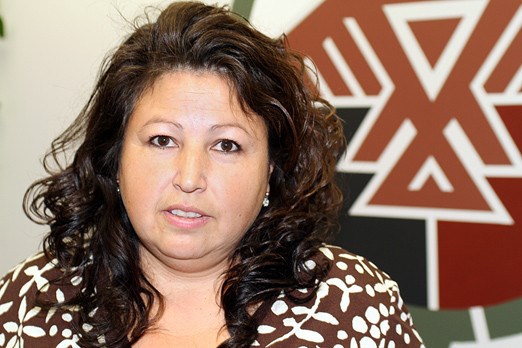Local retailers get a passing grade when it comes to recognizing point-of-sale exemptions for the recently implemented harmonized sales tax, secret shopper says.
On Wednesday, the first day Ontario retailers were required to give the exemption at the till, a secret shopper trip to some national retailers showed all were aware of the end of a two-month moratorium on the exemption, which required First Nations status card holders to collect receipts and submit them to the federal government for a refund of the 13 per cent tax.
Judy Currie, an administrative assistant at the Thunder Bay office of the Union of Ontario Indians, spent Wednesday on an exploratory shopping trip, which revealed that while not all head offices had communicated the change in government policy to their outlets, and not all cash registers were properly programmed to allow for the exemptions, not once was she refused.
Judy Currie, an administrative assistant at the Thunder Bay office of the Union of Ontario Indians, spent Wednesday on an exploratory shopping trip, which revealed that while not all head offices had communicated the change in government policy to their outlets, and not all cash registers were properly programmed to allow for the exemptions, not once was she refused.
“Yesterday I purposely went out to see if retailers were prepared for this change and I had mostly a positive experience. I found that the employees were ready – but their tills and their computer systems not yet,” Currie said.
Her shopping spree included stops at Canadian Tire, Zellers, Old Navy, Champs, Aeropostale and Wal-Mart, and came on the heels of a release issued by Anishnawbek Nation Grand Council Chief Patrick Madahbee, who used the opening day of the return of point-of-sale exemptions in Ontario to as a way to kick off rights-based agenda awareness campaign.
Currie’s experience – she did not visit any locally owned stores, though says she intends to do so – varied from location to location.
At Canadian Tire, for example, the staff was friendly, informed and aware, but struggled through the transaction.
“They had to exempt each item individually when processing it at the register,” she said.
At Old Navy, she was initially rejected. “When I presented my status card, she said, ‘We no longer accept them.’ I said, ‘As of today, you do.’ She said she didn’t receive notice from their head office. She struggled through the transaction and I had to wait for her to get some forms from her office, but in the end she honoured my card. She apologized for the delay,” Currie said.
At Old Navy, she was initially rejected. “When I presented my status card, she said, ‘We no longer accept them.’ I said, ‘As of today, you do.’ She said she didn’t receive notice from their head office. She struggled through the transaction and I had to wait for her to get some forms from her office, but in the end she honoured my card. She apologized for the delay,” Currie said.
But at the Aeropostale outlet at Intercity Shopping Centre, there was no problem whatsoever.
“They accepted the card and processed the transaction quickly. There was another Native woman behind me in line and saw that I had used my status card. She began digging in her wallet for her card. I asked her if she had been using her card today. She replied, ‘No.’ She didn’t know exactly when she was able to use it again and was happy to do so (yesterday),” Currie said.
When the province initially introduced the HST, a blending of the five per cent federal goods and service tax and the eight per cent provincial sales tax, government officials said the point-of-sale sales tax exemptions would no longer be allowed.
Then Revenue Minister John Wilkinson laid the blame at the feet of the federal government, saying they refused to budge.
Amid a flurry of protests, the feds capitulated, adding a two-month phase-in period.
Madahbee, who fought for the return of point-of-sale exemptions, said it was a learning experience, adding he was disappointed the message didn’t reach all retailers by the Wednesday deadline.
“The province-wide campaign that the Anishnabek led against the harmonized sales tax was ultimately successful,” he said in a release, “but in the process we learned how little other governments, the media and the general public know about Aboriginal treaty rights.
“Even after the province has sent out notices informing businesses that they must honour the rights of our citizens, on and off-reserve, to tax exemption, we are hearing stories of companies trying to gouge First Nations customers. These retailers are now breaking their government’s laws, as well as ignoring First Nation rights.”
Interview requests were made to both Old Navy and Canadian Tire head offices, but were not immediately granted.
